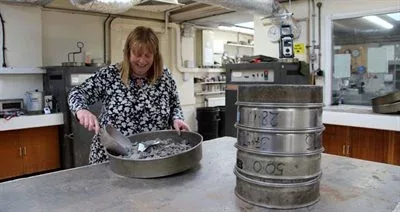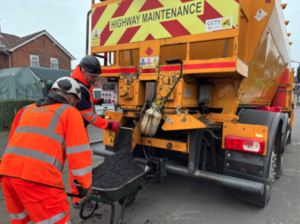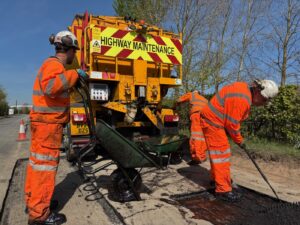There are only six local authority-run highways laboratories in the country, of which Staffordshire is one. Staffordshire Laboratory Manager Emma Loach talks through what the lab does, and how they make a crucial contribution to highways in Staffordshire.
“Most of the work that we carry out on our roads around the county are very visible, from gritting, to pothole repairs, to gulley cleaning.
However, tucked away in a corner of Stafford is our highways laboratory, where technicians conduct on-site testing of materials that are used on our roads and pavements, making sure they comply with current standards and specifications.
In the lab, we have what we call our sample wall, where we show people the different types of aggregate/ materials we use which helps with training and awareness. We also have a large piece of bitumen on the shelf that is very slowly moving down over time, which helps to show just how flexible a material it is. I find materials and their respective properties absolutely fascinating.
The laboratory itself has been in operation for over 60 years—I started as a laboratory technician in 1993. I love it here; the work we do is so varied, the teams are brilliant, and we really get a sense of how our work impacts the county. On any given day we:
– test in the lab or out on site all the materials to do with maintenance and resurfacing
– Check that works carried out by other companies on Staffordshire’s roads (such as utility companies) are being carried out correctly
– Check any roads we are looking to adopt as an authority, and look for any potential problems
– Give advice and support to hundreds of colleagues around the county
As a department we are constantly striving to innovate in everything we do. the Laboratory aims is to support trials on machines and new materials to see how they could potentially be used to help crews in their work. Testing new materials can take up to two years from initial test to being brought into commission, whereas machinery and equipment generally take less time. This is because its really important to check how material performs over time – ideally, a new road surface should last around 15 years, so we need to be sure the materials we use are up to this standard.
We test the full range of materials involved in road construction including aggregates and bituminous materials, carry out testing on site and regularly use machinery to take a core samples of a road, to ensure it will perform to our high standards. This allows us to test materials for quality to check they comply with relevant standards and specifications. Testing cores for density allows us to check workmanship and ensure that new work will be durable for the lifespan of the pavement.
Over the past 30 years I have seen many changes, and there will be many more to come in terms of the advancement of materials and technology. We will keep striving to ensure we get the optimum performance out of everything we use, and continue in our goal to make the roads in Staffordshire as safe and long lasting as possible. What we do in the lab has a real effect on road users not just in Staffordshire, but across the nation too.”
S
























